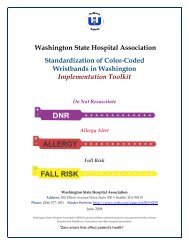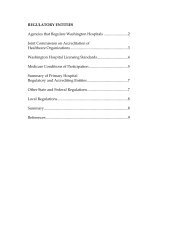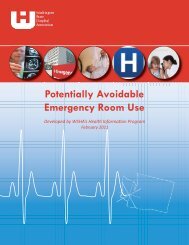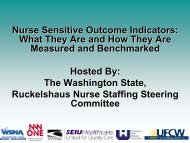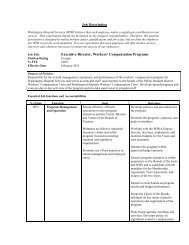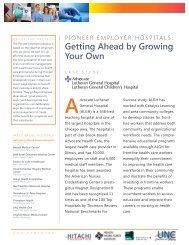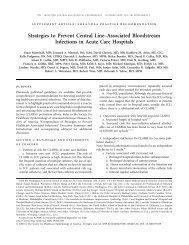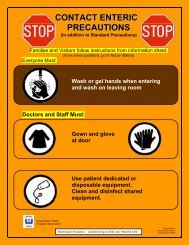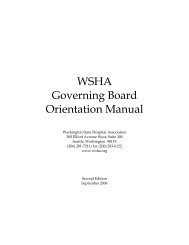CEO Performance Planning & Appraisals - An Enhanced Partnership
CEO Performance Planning & Appraisals - An Enhanced Partnership
CEO Performance Planning & Appraisals - An Enhanced Partnership
Create successful ePaper yourself
Turn your PDF publications into a flip-book with our unique Google optimized e-Paper software.
<strong>CEO</strong> PERFORMANCE PLANNING & APPRAISALS<br />
<strong>CEO</strong> PERFORMANCE<br />
PLANNING & APPRAISALS<br />
OPPORTUNITY FOR ENHANCED<br />
BRIEF DESCRIPTION OF REPORT OR<br />
PARTNERSHIP BETWEEN HOSPITAL<br />
INSERT BOARDS FROM REPORT AND THEIR HERE <strong>CEO</strong>S
PREPARED BY<br />
James A. Rice, Ph.D.<br />
Practice Leader<br />
Kate Brecke<br />
Consultant<br />
www.IHStrategies.com<br />
February 2009<br />
w w w.IH S t r at e gies .com 1
As hospital and health system boards explore ways to enhance the performance of their<br />
fiduciary duties, they quickly recognize their dependency on their <strong>CEO</strong> to guide and support<br />
their governance work. But how can the board be confident and comfortable that their <strong>CEO</strong> is<br />
performing his/her role effectively A central vehicle to assure <strong>CEO</strong> performance excellence is<br />
increasingly seen to be a new reliance on modern <strong>CEO</strong> performance planning and appraisal<br />
arrangements.<br />
While the business literature has extensive research into best practices for <strong>CEO</strong> performance<br />
management, the US healthcare sector has only recently begun to raise the bar on its study of,<br />
and calls for such best practices. To help more boards enhance their <strong>CEO</strong> performance<br />
planning and appraisal programming, we conducted a short web survey in mid-2008. The<br />
findings are summarized in this White Paper.<br />
In discussing the survey findings with a panel of <strong>CEO</strong>s, it was informative to have these<br />
observations shared:<br />
Insights about the need for new Initiatives<br />
“We have good intentions, but too often are a bit behind schedule. <strong>CEO</strong> performance<br />
goals and measures need to be developed prior to start of fiscal year, but that does not<br />
always happen.” <strong>CEO</strong> in East Coast<br />
“We have a pretty good system, but I think the board looks at my annual performance<br />
review like a visit to the dentist.” <strong>CEO</strong> from North Central<br />
“We review my performance, but do not use the process to really help me think<br />
strategically about my career development, and rarely even discuss succession or<br />
continuity planning.” <strong>CEO</strong> from West Coast<br />
Recession Squeeze and Increased Scrutiny of Executive <strong>Performance</strong> and<br />
Compensation Puts Pressure on Great Leaders<br />
Our recent national survey of 125 hospital and health system leaders provides fresh<br />
encouragement for boards and <strong>CEO</strong>s to raise the bar on their future performance management<br />
systems. Although this survey is focused on <strong>CEO</strong>s, it is likely that parallel calls for enhanced<br />
leadership review and performance development could apply to the growing number of<br />
physician leaders and other senior executive officers.<br />
w w w . IH S trategies.com 2
The recession is exploding demands on hospitals to deliver better ‘value for money,” and<br />
pressures are growing for more transparency and accountability from hospital boards and<br />
senior executives. All these forces interact to create a need for enhanced leadership within the<br />
board, physician collaborations, and executive ranks. The prospects for enhanced leadership<br />
improve when the leaders are more structured and formal in their approach to the annual <strong>CEO</strong><br />
performance review process.<br />
<strong>CEO</strong>-Board <strong>Partnership</strong> is Essential to <strong>Enhanced</strong> <strong>Performance</strong><br />
Most organizations are conducting <strong>CEO</strong> performance appraisals (98%), and most do so at the<br />
end of their fiscal year (45% versus calendar year of 15%) or in conjunction with other<br />
compensation decisions (35%). A majority of the boards ask the <strong>CEO</strong> to submit a selfassessment<br />
(98%), and then seek input from these sources*:<br />
Exhibit 1<br />
Sources of Input<br />
% Surveyed<br />
Entire Board 69%<br />
Officers of Board 46%<br />
<strong>CEO</strong> Direct Reports 22%<br />
Physician Leaders 18%<br />
Other Boards or Leaders 18%<br />
*Could respond to more than one source of input<br />
The Board Chairperson is most often tasked to discuss the results with the <strong>CEO</strong> (60%) or via a<br />
standing committee (30%). Very few deliver the review via the entire board (5%). Interviews<br />
with selected <strong>CEO</strong>s suggest the discussion with smaller groups can be the most useful and<br />
personal.<br />
w w w . IH S trategies.com 3
Alignment of Review Criteria to Organization’s Objectives<br />
While most <strong>CEO</strong> performance reviews are focused around a discrete event (year-end) (86%),<br />
31% are attempting to establish a culture where the experience occurs over a more extended<br />
period throughout the performance period. The criteria used in the review process vary, but<br />
most often are aligned to the overall objectives of the organization (82% are 1 or 2 on a 6-point<br />
scale in exhibit 2). Of significant note is the 6% to 18% who find very little or only moderate<br />
alignment of the <strong>CEO</strong>’s review to objectives of the organization.<br />
Exhibit 2<br />
Strength of Alignment<br />
Frequency of<br />
Alignment<br />
Strongly Aligned <strong>Performance</strong> Criteria to Organization’s <strong>Performance</strong> Objectives (1) 51%<br />
(2) 31%<br />
Moderately Aligned <strong>Performance</strong> Criteria (3) 12%<br />
(4) 4%<br />
(5) 2%<br />
Unaligned <strong>Performance</strong> Criteria (6) 0%<br />
Career and Succession <strong>Planning</strong><br />
Of the various components used in <strong>CEO</strong> performance management processes, the weakest is<br />
“provision for planning for career development of the <strong>CEO</strong>” (35% in exhibit 3). With a growing<br />
number of the nation’s hospitals and health systems moving in the 59-65 age cohort, boards<br />
would be well advised to focus greater attention on how to use the performance review process,<br />
not just for career planning, but for succession and continuity planning.<br />
w w w . IH S trategies.com 4
Exhibit 3<br />
Frequency<br />
Components<br />
Included<br />
<strong>An</strong>nual performance evaluation, including written and verbal feedback 91%<br />
<strong>Performance</strong> appraisal results influence merit increases and bonus comp 82%<br />
<strong>CEO</strong> self-appraisal 78%<br />
Balance of quantitative and qualitative goals with appropriate metrics 72%<br />
Written document outlining clear <strong>CEO</strong> goals and achievement metrics 69%<br />
Regular <strong>CEO</strong> progress reviews throughout evaluation period 42%<br />
Provision for planning for career development of the <strong>CEO</strong> 35%<br />
Criteria for <strong>CEO</strong> <strong>Performance</strong> Appraisal<br />
Ten criteria were measured for importance in assessing the <strong>CEO</strong>, with financial results scoring<br />
the highest at 5.83 on a 6-point scale where “6” is important and “1” is unimportant (exhibit 4).<br />
In the current environment we are likely to see Quality increase, but not to the point of<br />
surpassing Financial Results and Strategic Vision.<br />
Exhibit 4<br />
Criteria<br />
Importance of Criteria<br />
Financial Results 5.83<br />
Strategic Vision 5.75<br />
Quality Scores 5.73<br />
Board Relations 5.71<br />
Physician Relations 5.68<br />
Decision-Making 5.65<br />
Patient Satisfaction 5.65<br />
Communications 5.59<br />
Employee Satisfaction 5.45<br />
External Relations 5.40<br />
w w w . IH S trategies.com 5
From Appraisal to Appreciation and <strong>Planning</strong><br />
Following this web survey, we convened board, <strong>CEO</strong> and HR leaders to begin a dialogue on<br />
“next generation appraisals.” The consensus was that the challenge was less an issue of<br />
improving the review, and more a challenge of moving the focus from retrospective assessment<br />
to prospective planning and support for the <strong>CEO</strong>’s performance. High performing <strong>CEO</strong>s would<br />
welcome more intelligent conversations about board expectations for performance metrics and<br />
links to incentive compensation, and that these expectations should:<br />
• be articulated before the performance period begins;<br />
• recognize opportunities for <strong>CEO</strong> career planning and growth;<br />
• lead to one to two mid-year conversations with the Board Chairperson about progress to<br />
plan;<br />
• link to meaningful board investments to support <strong>CEO</strong> performance enhancement<br />
(networking with other high performing <strong>CEO</strong>s, mentoring opportunities, access to executive<br />
coaching, and even short sabbaticals to acquire or refine targeted skills and competencies<br />
away from the office); and<br />
• assure that more modern incentive compensation arrangements linked to significant and<br />
strategic advances by the hospital or health care system.<br />
As the industry moves into the economic challenges of a national economic recession and<br />
increased executive scrutiny, boards and <strong>CEO</strong>s will need to carefully plan for conversations<br />
about sensible and systematic ways to design and continuously enhance the performance<br />
management system; not just for the <strong>CEO</strong>, but for all senior executives and physician leaders.<br />
In assuring this piece of the compensation puzzle is in place, the organization is going a long<br />
way to ensure that their pay practices are in-line and will hold up to the scrutiny that may be<br />
given to their organization.<br />
Our Governance and Leadership practice will be issuing additional strategies throughout 2009<br />
to enhance both the efficiency and effectiveness of your systems for executive, physician, and<br />
board leaders’ performance management.<br />
For additional questions or to request additional information, please contact<br />
jim.rice@ihstrategies.com or call 612-703-4687<br />
w w w . IH S trategies.com 6
EXCLUSIVE TO HEALTHCARE. DEDICATED TO PEOPLE. S M<br />
E X E C U T I V E T O T A L C O M P E N S A T I O N • M S A E X E C U T I V E S E A R C H • P H Y S I C I A N S E R V I C E S<br />
M S A H R C A P I T A L • G O V E R N A N C E & L E A D E R S H I P S E R V I C E S<br />
Y O U R T R U S T E D A D V I S O R<br />
F O R E N H A N C E D P E R F O R M A N C E.<br />
A B O U T I N T E G R A T E D HEALTH C A R E STRATEGIES<br />
Integrated Healthcare Strategies works exclusively in healthcare to assist you with physician strategy and compensation,<br />
employee compensation, executive compensation, human capital solutions, labor relations, leadership transition<br />
planning, executive search, employee surveys, performance management and trustee governance solutions. We are the<br />
premier firm in the country offering a suite of services that focus specifically on healthcare solutions.<br />
A B O U T GO V E R N A N C E & LE A D E R S H I P SERVICES<br />
The Governance & Leadership Practice of Integrated Healthcare Strategies is committed to being the trusted advisor for<br />
Board Members, Executive and Physician Leaders of high-performing health care organization. Our experts offer<br />
valuable information, insights, design, implementation strategy, and support for a variety of governance and leadership<br />
issues and challenges.<br />
FOR MORE INFORMATION, PLEASE CONTACT:<br />
Integrated Healthcare Strategies Marketing Department<br />
Phone: (800) 327-9335 • Fax: (612) 339-2569<br />
Marketing@IHStrategies.com • www.IHStrategies.com<br />
© 2009 INTEGRATED HEALTHCARE STRATEGIES. ALL RIGHTS RESERVED.<br />
This publication may not be reproduced, stored in a retrieval system or transmitted in whole or in part, in any form or by any means,<br />
electronic, mechanical, photocopying, recording or otherwise, without the prior written permission of Integrated Healthcare Strategies.





